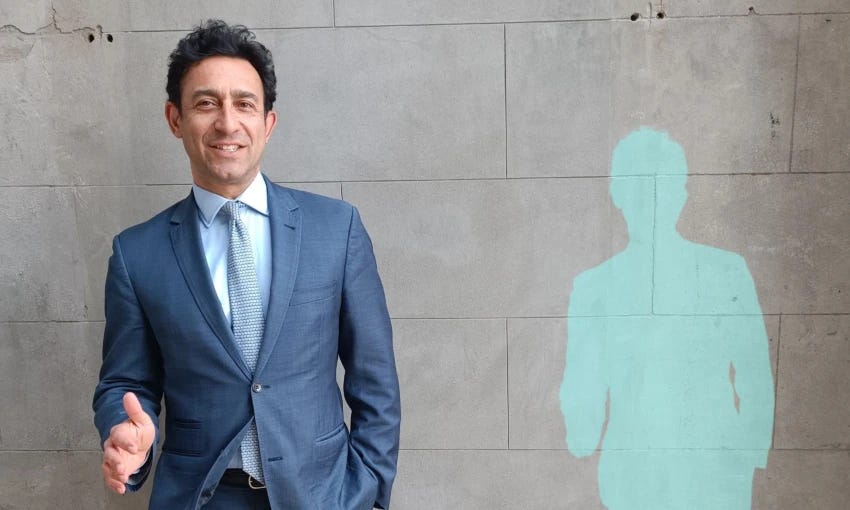Leaked reports reveal major conflict inside NZ’s tech sector
In three years, tech startup We Are Indigo received over $5m in government contracts. Now, two confidential reports into the firm have caused a major storm and at least one high-profile resignation
Mōrena and welcome to The Bulletin for Tuesday, November 1, by Anna Rawhiti-Connell. Presented in partnership with Z Energy.
In today’s edition: the biggest risks to our national security; AUT to cut more academic jobs than previously proposed; National’s byelection candidates; but first All Blacks, big investors and government agencies caught up in NZ tech sector conflict
We Are Indigo’s Andy Hamilton, Patrick MacFie and Monty Betham (Image design: Tina Tiller)
Multiple OIA attempts made to obtain reports leaked to The Spinoff
Some of you may have seen the news over the weekend about the resignation of Rachel Kelly from the board of Callaghan Innovation. Though not explicitly named in her LinkedIn post, it’s understood the resignation is connected to Callaghan’s handling of due diligence reports into celebrity-backed New Zealand tech firm, We Are Indigo. Despite multiple Official Information Act requests, Callaghan has declined to release the reports. Two reports have been leaked to The Spinoff. They contain a lengthy list of troubling allegations. This morning Duncan Greive unravels the saga in an extensive report involving both small startup founders and major figures within our innovation sector.
We Are Indigo strongly rejects allegations contained in reports
We Are Indigo was founded by former Xero executive Pat MacFie, former boxer Monty Betham, and former Icehouse chief executive Andy Hamilton in 2019. Funding received by the companies through government contracts totals over $5.5m. As Stuff’s Daniel Smith reports, much of the conflict Greive extensively details has played out on LinkedIn but has now blown up and is playing out in the public arena. We Are Indigo has strongly rejected the allegations contained in the reports.
Investigations led to We Are Indigo not being selected as Callaghan provider
As Greive writes, this is a story that’s been bubbling away within New Zealand’s tech sector for some time. In June, NBR’s Maria Slade reported (paywalled) on legal action taken against We Are Indigo by Dunedin-based digital marketing agency K&J Growth over unpaid invoices. Slade followed up in September (paywalled) with another story about Callaghan hiring private investigators to carry out due diligence on potential providers. As a result of those investigations, We Are Indigo was not selected for a start-up support scheme. Despite the Ministry of Business, Innovation and Employment being informed of the issues with We Are Indigo in June, a month later it was successful in winning a contract for work from Creative NZ.
Callaghan aware of allegations of bullying by some players in startup ecosystem
Callaghan Innovation is the government's innovation agency. It is majority funded by the government. In a statement released yesterday it outlined that the due diligence reports were a response to concerns they had about allegations of bullying within the startup eco-system. As BusinessDesk’s Pattrick Smellie reports (paywalled), We Are Indigo has attracted high profile support, with the prime minister and a range of well-known New Zealanders appearing in a small buisness “love letter” video in the early stages of the pandemic. National’s Simeon Brown has been asking questions about it. Minister for small business and economic development, Stuart Nash has been following the situation. Sir Ian Taylor has been involved. As Greive writes, many high profile people are in the blast zone on this one and the fallout is likely to continue.
Journalism is an essential part of society and shouldn’t be a privilege of those who can afford it. The support of readers like yourself helps to ensure The Spinoff remains freely accessible to all, regardless of their ability to pay. If you value what we do and have the means to do so, please make a donation today.
Natural disaster and misinformation top list of national security concerns
A landmark national security briefing has revealed New Zealanders are significantly more concerned about natural disasters as a threat to national security than citizens in other countries. Produced by nine government agencies, the National Security Long-term Insights briefing is the first of its kind. It surveyed 1000 people concerning the perceived risk of various threats to national security. As the Herald’s Adam Pearse reports, New Zealanders feel particularly at risk of a cyber-attack - something the briefing acknowledges the government can’t adequately protect its citizens from. The briefing’s authors highlighted New Zealand’s older population would be more vulnerable to extremism and false information. Natural disasters and the intentional spread of harmful information are seen as the highest risks to New Zealand’s national security.
AUT cut more academic staff than originally proposed
Last month, AUT announced a major restructure with proposals to cut up to 230 jobs. Most of those cuts were among staff in specific academic areas. It was proposed that 150 full-time equivalent positions be cut. As the Herald’s Jamie Morton reports, AUT has decided to cut 170 academic jobs, 20 more than originally proposed. Tertiary Education Union (TEU) organiser Jill Jones says the union is “disgusted and horrified" by the change. The union has challenged the business case for the restructure. The union's branch president at AUT, David Sinfield, said he was particularly frustrated at Vice Chancellor Damon Salesa's refusal to directly answer questions about the restructuring.
“Strong, talented and diverse shortlist” for National in Hamilton West byelection
The National Party revealed its candidate shortlist for the Hamilton West byelection last night. National Party president Sylvia Wood said “We’re excited to select a candidate from such a strong, talented and diverse shortlist”. The shortlist includes business director Rachel Afeaki-Taumoepeau, the general manager of Oceania Health Dr Frances Hughes, and chief executive of Ngāi Tai ki Tāmaki, Tama Potaka. The party copped a fair amount of criticism following the release of the candidate shortlist for the Tauranga byelection which was accompanied by a photo of the contenders in remarkably similar suits.
Click and collect
Politik’s Richard Harman has some good analysis of the alternative Three Waters proposal presented by three mayors yesterday
Relocating nurses around the country to ease demand in emergency departments considered but deemed too risky
Chief executive of Free Speech Union calls on Christopher Luxon to make his position known on hate speech law
Is the government missing its handbrake?
I’m kind of at the point of tapping out of the Elon Musk/Twitter psychodrama (that’s not to say it's not consequential) but this is a good take on the whole thing
Got some feedback about The Bulletin, or anything in the news? Get in touch with me at thebulletin@thespinoff.co.nz.
If you liked what you read today, share The Bulletin with friends, family and colleagues.
Toby Manhire talks to new TOP leader Raf Manji. Communities Against Alcohol Harm's Emily Worman and Grant Hewison explain why change to the way liquor licenses are granted is so desperately needed. Chris Schulz tells the story of 2000s New Zealand rock band Tadpole’s fight for the rights to their own back catalogue. Sam Brooks reviews the new season of The White Lotus. Alex Casey collates the greatest moments of Dame Susan Devoy's show-stealing run on Celebrity Treasure Island.
Netball Australia land new sponsor
Bit of an update on the Netball Australia sponsorship saga. After Gina Rinehart’s company Hancock Prospecting pulled out, the national netball body has landed a new sponsor. The state of Victoria’s tourism and events company, Visit Victoria has signed on for a five year deal worth $15m. Honestly, this seems like a very good resolution after a pretty nasty series of events that put players in very difficult situations. The Washington Post has a great piece on what the episode bodes for the $54b sports sponsorship market.
How should the NPC work?
Closer to home, rugby union bosses will meet this week to discuss the future of the NPC. Salary caps are on the table as smaller unions struggle to compete with larger unions. Rugby Southland general manager Steve Mitchell said “We shouldn’t be travelling the country buying players, we should be identifying and supporting the talent in our own region”.
“I own a basket I can never throw away”.
In the week leading up to the COP27 climate conference, The Guardian is publishing an essay a day from Pacific writers about how the climate crisis threatens the survival of their islands. The Guardian Australia's Pacific editor Kate Lyons introduces the series beautifully, writing about a basket she bought in Tuvalu. The first essay is from Julian Aguon who writes about the absence of birdsong on Guam as a result of climate change, the introduction of invasive species and military expansion.









